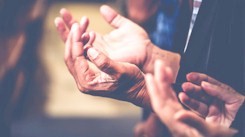
Possibly it’s the shared physical
activity of Muslim prayers
that enables everyone to feel the trying. Maybe when we’re better
able to sense that,
we’re more tolerant and forgiving of the various ways that people fall
short of
who they’d like to be.
Whatever the origins of the good
feelings, I believe people
left the service a lot better prepared to face their day, and to go
about their
business despite monstrous violence having been recently perpetrated on
their
community. That’s
probably what they had
come in search of—whether not they’d been able to put their finger on
it when
they first came through the door.
As for the imam, my estimation of him
soared. Clearly,
there were more important
qualifications for doing his job than a good singing voice. The influence of age in
the acquisition of
wisdom was also overrated.
For my own part, I was grateful to
have experienced a real-life
example of Islam in action in a difficult situation, which stood in
stark
contrast to the images of jihadist extremists that have come to
dominate our
media, and consequently, our public imagination.
Certainly, some people are doing
horrendous things today in
the name of Islam. But
to confuse these
actions with the religion itself would make no more sense than to see
the
burning crosses of the Ku Klux Klan as embodiments of Christianity.


